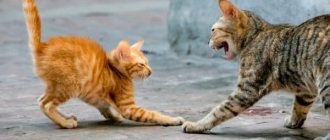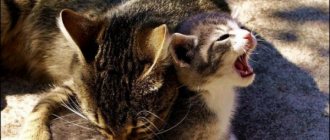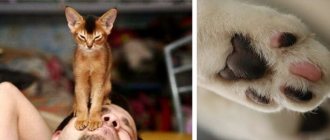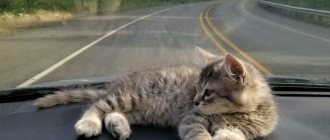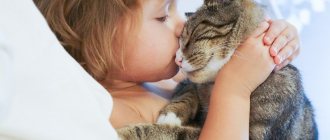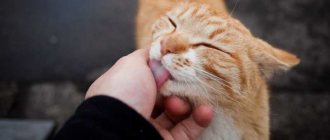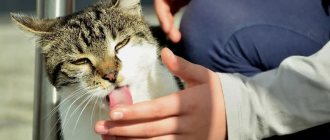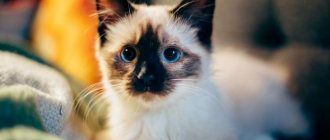Cats are clean animals, but due to their special constitution, they simply cannot lick some areas of their fur. In this case, a cohabitant comes to the rescue, who is also not against mutual “cleaning”.
This explains the fact that when a cat is stroked in places that are not difficult to lick, he sometimes begins to get angry, show aggression and dissatisfaction, but if you scratch behind the ear or under the neck - so please!
Social connection
In 2004, a study was conducted on social interaction between stray cats. Scientists have noticed that allogrooming is typical for cats that already have established relationships with each other. “Strangers” did not show such behavior - in other words, the cats did not want to care for other animals that were unfamiliar to them, which is quite logical.
The researchers also concluded that those affected by allogrooming tend to be very friendly, purring, and tilting or turning their heads. They can expose the back of their head or the top of their head, that is, those parts of the body that are difficult to care for independently. This behavior may be motivated by a need for help regarding hygiene.
Why do cats lick themselves?
Most often, cats, of course, lick themselves. According to various reports, cats devote from 30 to fifty percent of their time to personal hygiene - in other words, virtually constantly, if the cat does not sleep or eat, it washes itself.
In addition to the fact that cats routinely keep their own fur clean, licking has several other necessary functions for them. With the help of licking, they regulate their own body temperature: they moisten their fur with saliva, the evaporation of which cools the body... and relieves stress. Licking also stimulates blood circulation.
There is another well-known trait of cats - licking wounds. If something hurts a cat, not necessarily on the surface of the body, she will lick this area. From time to time, obsessive licking can cause even more damage than was previously present, so it is always necessary to pay attention to how your pet is licking itself, and, if necessary, take it to the veterinarian.
Licking is associated with higher rank
Another, earlier study found that in most cases, higher-ranking cats groom lower-ranking ones. In this case, most often those animals that are licked sit or lie, while those caring for them take higher positions - standing or sitting upright. A cat, without resorting to fights and other aggressive actions, can show its dominance by licking another.
Maintaining high status
Another finding is that cats of higher status in the pack are more likely to lick less respected cats, and not vice versa. The hypothesis is that perhaps dominant individuals secure their position in this way, which is a safer way compared to fighting.
photo: catster.com
The cat is overly excited
Cats love to be petted, but sometimes a long petting session gets them over the edge. When this happens, our sweet and laid-back kitties may experience something called petting aggression.
It is thought to have something to do with the nerve endings connected to your cat's fur, and petting too often can cause discomfort. If your cat is gently licking you while you pet her and she suddenly bites you, this is probably the reason.
Image credit: congerdesign, Pixabay
Signs that a cat is overstimulated include widened eyes, folded ears, and tail flapping. Take the time to notice if your cat exhibits these signs when you pet her, and end the petting session before your cat reaches the point of overstimulation.
Some cats have areas of their fur that they can tolerate longer than others. By watching your cat's body language, you can make petting enjoyable for both of you.
Maternal instinct
The licking of her kittens by a mother cat indicates not only the maintenance of hygiene of the babies, but also other things necessary for the life of the cubs:
- eliminating the characteristic odor that can attract predators;
- stimulating proper breathing;
- facilitating bowel movements and urination in kittens;
- direction of the crumbs to the nipples;
- training in this procedure.
By three weeks, kittens can already lick themselves. Then they begin to lick their brothers and sisters, strengthening family ties. A cat can continue to lick its babies even into adulthood. Scientists have noticed that the children of unscrupulous mothers who poorly cared for their brood grow up to be the same slobs.
Reasons for the unusual cat habit
Any animal is attached to its owner. It is generally accepted that cats are loners by nature, loving to “stand their ground.” But not everyone should be considered that way. Cats, like people, have different personalities. Some animals absolutely cannot do without their owner and start licking him for an hour.
The main reasons why a cat licks a person are:
- thermoregulation;
- reaction to odors;
- expression of love;
- maternal instincts;
- dominant or passive behavior;
- lack of attention;
- diseases.
Everyone knows that a cat’s body temperature is much higher than a human’s. It is almost 39 degrees. Due to this, cats are extremely thermophilic and require large amounts of heat to warm their bodies. The human body emits a huge amount of heat, which is very attractive to your pet.
Many owners notice that cats prefer to lie down and start licking exactly the place where pain occurs in humans. This is explained by the fact that the diseased organ produces increased heat, which in turn is greatly preferred by representatives of the cat family.
Cats have always been attracted to different smells. For example, they love the smell coming from human hair. Especially after washing your hair. The cat perceives hair as “fur” on humans, so it licks it.
To avoid additional “washing” of your hair, it is recommended to use citrus-scented shampoos. You can also distract your pet from licking with food or toys.
The reason why a cat licks its owner can also be explained as follows. While being in close proximity to a person, the pet experiences such a pleasant feeling of comfort and calm.
If a pet shows an active interest in the child in the house, then it is likely that she perceives the human child as her own. The mother cat is always nearby and constantly licks her babies. For this reason, a “dose” of washing and sleeping in an embrace with a “furry mommy” in such a situation are provided to the child without fail.
In order to avoid some discomfort during sleep, the cat owner is not recommended to accustom her pet to sleep with people. It is important to note that if the animal has not undergone the procedure of castration or sterilization, but has not produced offspring, cats exhibit false maternal instincts. Cats may experience hormonal imbalances. Therefore, it is important for owners who do not plan to breed offspring to resolve this issue in a timely manner.
Persistent licking of the owner's hands or face can be a kind of signal for help for various diseases in the animal. For example, it may be bothered by parasites in its fur, so it becomes restless and licks not only itself, but also people. If you suspect any disease, it is better not to start self-medication, but to consult a specialist.
If cleanliness is one of the virtues, then cats should live in heaven, in a place specially designated for them. Felines' dedication to neatness gives them a reputation as clean, refined animals. In fact, an adult cat spends 30 to 50 percent of her waking hours demonstrating some type of washing behavior. From the moment of birth, a cat learns self-care techniques. By licking the cubs, the mother cat stimulates the kittens' breathing and their sucking instincts. Licking helps guide blind babies directly to the nipples.
When a mother cares for her kittens, she not only washes them, but also establishes a bond with them. Licking also helps kittens' digestive and excretory systems; The little animals can defecate only when their mother's rough tongue stimulates their tummies.
Two-week-old kittens begin to lick themselves, hygiene and “social” instincts oblige them to do this. Most kittens know how to wash themselves before they leave their mother. But those who were poorly cared for as children become unkempt adults.
Cats clean most of their bodies using their tongue and teeth. The central part of the murka's tongue contains many tiny, backward-facing tubercles. These rough spots make the cat's tongue a perfect cleanser.
After eating, your pet may spend a lot of time licking her mouth, mustache, and chin clean; however, washing is not only about a clean face. During the "sanitary hour" the cat licks and cleans the shoulders, front paws, then the sides, genital area, hind legs and tail from base to tip. Each pussy has its own washing ritual: your own may start its toilet from the shoulders, while another will lick the tail first.
If a cat finds a piece of dirt or something foreign on itself while licking, it gets rid of it with the help of its teeth. She uses her teeth to bite the dirt between her toes and clean it off her paw pads.
But licking and biting alone cannot reach all parts of the body, so for personal hygiene the cat uses either wet front or hind paws. She prefers to “handle” herself with her front paws until they remain slightly wet; First, she passes this “washcloth” over the face and head, from the ears and eyes to the cheeks and chin. After several rubbings, she licks her paws again; Having finished with the head and neck, he proceeds to more distant parts of the body. Having cleaned one half, he changes his paw and repeats the same procedure on the other side of the head.
The same places that cannot be washed with the tongue or front paws are scraped by the cat with the hind paws.
Why do cats wash themselves? You may have noticed that your cat washes itself constantly, while your neighbor's pet only starts washing itself once it gets dirty enough. Or maybe it caught your eye that your pet begins to wash itself after being frightened by a loud noise or having received a scolding for some offense? Humans and cats wash themselves for different reasons; Regular cleaning routines are important for all cats.
1. By pinching its fur, the cat stimulates the glands located on the skin at the base of each hair. These glands produce sebum, a kind of oily secretion that lubricates and protects the fur from moisture. After stimulating these glands during the washing process, the cat spreads sebum throughout the fur with its tongue.
Another significance of this secretion is that it contains cholesterol, which in the sun turns into vitamin D, which helps strengthen bones and teeth, and also helps the cat’s body accumulate calcium and phosphorus. Thus, by washing, Murka provides the necessary elements for the formation of such an important vitamin.
2. Washing the cat in itself is of great importance. During this procedure, the cat removes fallen, dead hair from its fur. Most pussies lose a lot of hair in the spring or during illness; In addition, dry, warm indoor air leads to hair loss in pets all year round. To prevent matting of cats' fur, dead hair must be removed.
But, in addition to inconvenience, often painful, matted fur can become a favorable environment for the development of parasites. Regular washing fluffs up the coat and thus reduces the risk of parasites - ticks, fleas and other insects.
3. Washing helps your cat control its body temperature. Wool plays the role of a protective layer between the body and the environment, and therefore clean and healthy fur better maintains normal temperature.
When a cat washes itself, it places tufts of hair in different directions. And depending on how the hair is styled, she can regulate her own temperature. A cat that washes itself thoroughly usually has smooth, fluffy fur, and it lies in separate layers. When cold weather sets in, the cat uses saliva to smooth out the fur, making it a more effective insulator and helping the body retain heat.
But your pet also washes itself to cool down. Most mammals begin to sweat when they overheat to lower their body temperature. Cats also have sweat glands, but because their body is covered with hair, sweat is only produced on the pads of their paws, which brings relief to the body. This is not enough to completely get rid of excess heat.
The cat smoothes its fur so that the fur allows air to penetrate between the hairs, which cools the skin. Animals may breathe rapidly to keep their bodies cool, but a third of the heat is lost through their skin and fur.
But washing also has social and emotional functions. If washing itself has great health benefits, then the cat's behavior in this case can be regarded as a form of “social interaction”. Kittens begin to lick and wash each other and their mother from the age of three weeks. Mutual washes typically peak between five weeks and four months. Then, as experts testify, this habit fades away.
As they grow older, mutual washing most often occurs between relatives from the same family. However, when several unrelated cats gather and mutual consent is established between them, they can also lick, wash each other and play with each other. An example of this would be a gathering that researchers call a nightclub. This term refers to animal games on neutral, and not on the personal territory of a cat. It is not the warmth of the females that attracts them here; they do not fight among themselves. The animals simply lick each other and greet each other with purrs, and then return to their homes.
During the mutual washing procedure, cats usually lick each other's most inaccessible places - the head and neck. This activity is fun and provides an opportunity to interact with other animals. One could even say that mutual washing is a unique form of communication, an expression of love and friendship. By licking you and accepting your caresses, the pussy tries to involve you in this process, which satisfies not only physical and “social” needs, but also enriches it with positive emotions. The cat loves to be stroked, and by licking itself, it thereby gives a massage.
When you stroke or caress a cat, its nervous system also reacts to this. The heartbeat slows down, and as the body relaxes, muscle tension subsides. At the same time, more gastric juice and saliva are produced, and digestion improves. When a cat is scared or no one pets it, there is a deterioration in the functioning of the digestive organs.
Very often, a cat washes itself when it is confused or frightened by something. Some animal behaviorists believe that washing a cat helps itself overcome conflicts, and massage calms it down. You've probably noticed how a cat, faced with stress, initially reacts violently to it, and then suddenly calms down and begins to wash itself.
Have you ever seen your pet in a difficult situation? For example, how does she roll off the couch and fall on the floor? What does she do immediately after this? Most likely, after looking around the room and seeing no one to watch her, your cat will begin to lick herself. Some cat experts claim that fear or confusion causes an increase in body temperature in these animals and, by washing themselves, they thereby get rid of excess heat.
H. Nepomnyashchiy “Keeping a Cat”
The cat shows affection to you
It may not be your first choice, but small bites can be a sign of affection between cats. This is a normal behavioral interaction, especially between kittens. Some cats extend this same behavior to their owners!
If your cat is acting affectionate and then comes over to lick and bite, this is probably what is happening. Although there is no malicious intent behind it, sometimes you don't want to get bitten! In this case, pay attention to the cat's behavior before it approaches you and distract it before it gets to that point. You can still give and receive plenty of affection from your cat—just draw the line at love bites!
Why do cats lick toys?
Some cats even lick their toys, mostly soft ones or those covered with fur or feathers. Most often, this is done by cats that were “disliked” in childhood - taken away from their mother early and placed, for example, in a shelter or in a family without pets. They can suck on parts of the toy, thus making up for the lack of communication with their mother in childhood.
Licking toys also indicates a highly developed maternal instinct in cats. Sometimes a cat even has an object specially chosen by her, which she considers her baby: she carries it in her teeth and hides it in the house.
How can I stop my cat from constantly licking?
To stop your cat from constantly licking:
- Stop them from continuing this behavior.
- Start by removing any intangible items from your home that they frequently lick.
- If you cannot remove the items, spray them with a special pet spray, which should have a bitter taste and discourage your cat from continuing to lick.
To occupy their licking time, try providing safer alternatives such as non-toxic pet toys and spend time cuddling with them instead. If you distract your cat during times when she is most likely to want to lick, you can encourage her to stop this bad behavior.
Licking due to possible diseases
Why does a cat trample with its paws: the main reasons and what does it mean?
In some cases, the obsessive attention of cats may be associated with hidden diseases. They cannot talk about feeling unwell or painful; they use petting and meowing. Some owners are alarmed by the cat's dramatically changed behavior, and they go to the veterinary clinic for a consultation, where the disease is discovered.
At the vet
Fleas
Blood-sucking parasites cause discomfort and unpleasant sensations, an obsessive desire to scratch the itchy place.
The cat, focusing on its own feelings, sincerely believes that the owner has similar problems. The worries result in attempts to clean the hair and skin of household members from fleas - they do not know how to wash thoroughly without missing anything and the cat comes to the rescue.
Infections
Clinical signs of certain infectious pathologies include dermatological rashes and obsessive itching. Certain areas of the skin itch every minute and cause discomfort. The suffering animal is treating not only himself, but also the entire family. In difficult cases, surrounding objects are treated.
Allergy
Allergic reactions in furry pets are caused by:
- improperly selected diet, changing the usual food;
- human shampoo or soap;
- cosmetics;
- tobacco smoke;
- air fresheners and other fragrances.
Persistent discomfort forces the pet to carefully care for its coat, not forgetting about the skin and hair of its owners.
Ringworm and fungi
Ringworm in animals appears as small patches of baldness. In this case, scabs or erosion may be present on the skin, but this depends on the causative agent of the disease.
Quite often, the reason that an animal licks itself more often than usual is a fungal infection. It is impossible to identify the fungus without special equipment, but dry skin and flaking can help you suspect the disease. It is these symptoms that cause discomfort to the cat, in response to which he constantly licks himself, itches and chews his fur.
Upon careful examination, you will notice the following signs on the skin:
Help with grooming
Moreover, cats often “ask” their neighbors to help them with grooming. Usually these are parts of the body that are difficult for them to reach.
Have you noticed that people mostly pet and scratch cats on the head or neck area? These are the places that cats most often help each other lick. That is why, if a person begins to stroke other parts of his pet’s body, this often causes discontent and aggression. Scientists working on this issue also came to this conclusion.
Summarizing
Cats don't lick or bite without reason, so if your cat seems to behave this way regularly, then it's worth taking the time to find out why. If you think it's just affection or play, then you can either let them continue (if you don't mind getting your hand pinched) or find ways to distract your cat before she bites you.
If you think your cat's biting behavior is due to overstimulation, then it is important to make it clear to everyone in the house that petting should be kept short and to watch for signs of overstimulation in your cat. Petting-induced aggression is not your cat's fault; it is simply an automatic reaction to an unpleasant feeling. By paying attention to our cat's body language, we can ensure that we don't make her feel uncomfortable.
If you think your cat's biting behavior is related to stress, it is important to talk to your veterinarian and ask for advice on how to minimize it. Prolonged stress is harmful to cats and can lead to health problems.
If your cat ever licks and then bites you, do you understand why? What did you do to stop them? We'd love to hear from you!
Posted by Emma Stenhouse Emma is a freelance writer specializing in pets, outdoor activities and the environment. Originally from the UK, she lived in Costa Rica and New Zealand before moving to a small holding in Spain with her husband, their 4-year-old daughter and their dogs, cats, horses and birds.
Why do cats lick other animals?
Cats, especially those that live in the same territory, can also lick each other - and there are several reasons that explain this behavior. Firstly, licking other animals is aimed at establishing social bonds with them - and it can really indicate the sympathy of one pet for another. Or maybe not talk. Sometimes in a cat pack, the dominant animals lick the outsiders, thus asserting their status among other animals in the pride.
Secondly, cats often help each other with hygiene. One cat may even ask the other to help with grooming. You may notice that cats most often lick each other's necks or heads—precisely those places that are impossible or difficult to wash on their own.
Thirdly, licking other pets is directly related to the maternal instinct of cats. All cats lick their newborn kittens. This, first of all, helps them stay clean, because kittens obviously cannot take care of themselves in the first weeks of life. In addition, by licking, the cat seems to hide the smell of a newborn kitten, which can attract predators. Licking is also an element of training - already from the fourth week of life, kittens begin to wash themselves.
Stressed cat
Cats are sensitive creatures and sometimes they show stress by licking and biting. Some cats will groom themselves excessively, even pulling out fur. If your hand is near your cat, it may lick and then bite your hand.
Many things can cause stress in our cats, including moving to a new home, meeting a new pet, or being visited by strangers. If your cat is really nervous, talk to your veterinarian. Using a pheromone diffuser can also help calm your cat.
© shutterstock
Reasons for washing cats
All animals lick themselves differently: some begin the procedure from the hind legs, others from the muzzle or shoulders. The tiny tongue does not reach the entire body, then periodically licking wet paws comes to the rescue. Hygiene sessions bring undoubted benefits to the animal, namely:
- Activate the glands that secrete the oily substance sebum. It protects the fur from getting wet and is spread throughout the entire coat by the tongue.
- The secretion contains cholesterol, which is converted into vitamin D under the influence of ultraviolet radiation.
- During cosmetic manipulations with fur, dirt, dead hairs, and parasites are removed. Fleas and ticks do not stay long on a clean and well-groomed body.
- Regulate the temperature by laying the fibers in different directions. The presence of an air layer between the fur and skin allows the body not to overheat in the heat and not freeze in the cold, so keeping the fur clean is the key to the health of the predator.
- Vigorous washing may indicate an animal's confusion or a stressful situation, such as a fight with a neighbor's cat. Washing makes it possible to calm the nervous system, think and retreat to occupied positions. There is an opinion that during a conflict, a cat’s body temperature rises and licking allows the body to quickly return to normal.
Expressing affection and care
Usually, the first thing a kitten feels is the touch of its mother's tongue. In the future, cats lick each other to show love. These animals are very clean, so mutual washing is a whole cat ritual. Consequently, by licking a person’s hands and face, a cat recognizes him as a relative.
Despite the fact that affection is not the most common reason for licking the owner, such behavior is a variant of the norm. If dogs lick their owner for a long time, then cats are less emotional and more often limit themselves to a single touch of the tongue. Experts note that this behavior especially often manifests itself after sterilization, when the animal’s level of aggressiveness drops. The early separation of a kitten from its mother, when a person is involved in feeding it, has a similar effect. Some experts believe that this serves to form the habit of licking and even sucking the owner’s hands already in adulthood.
